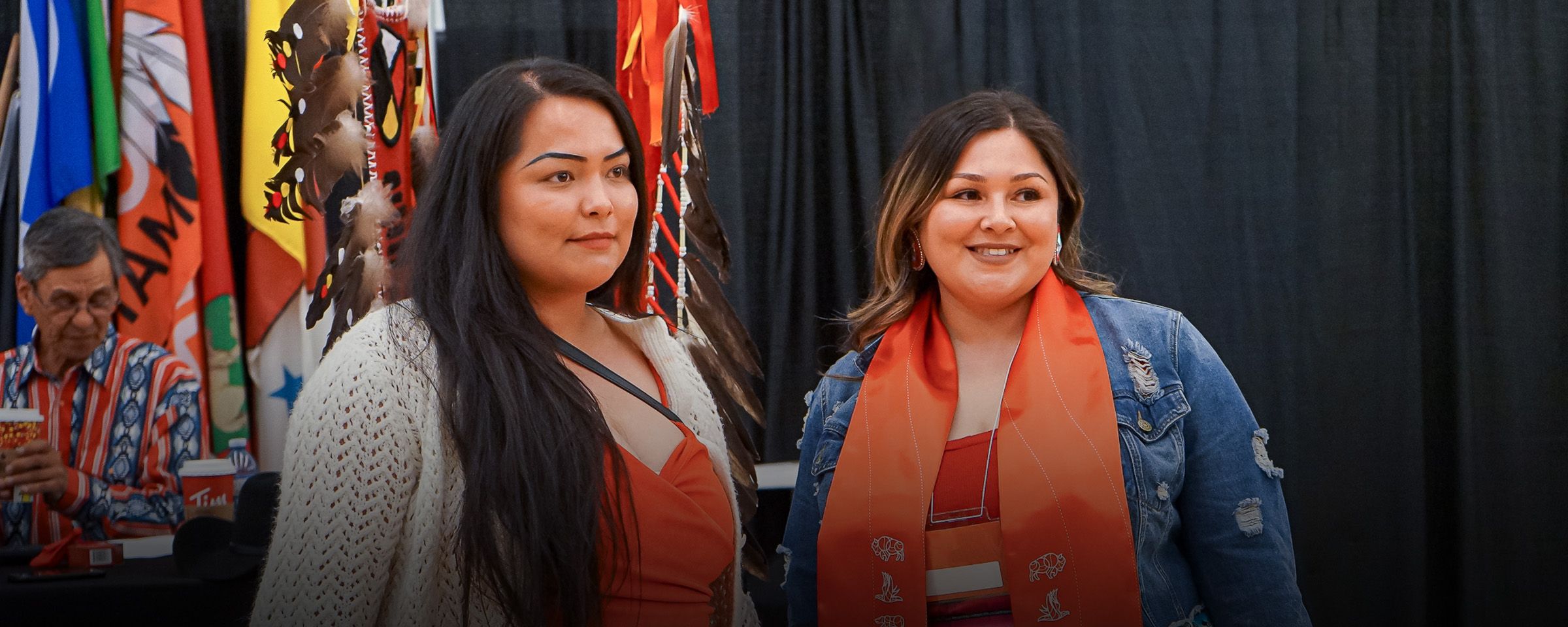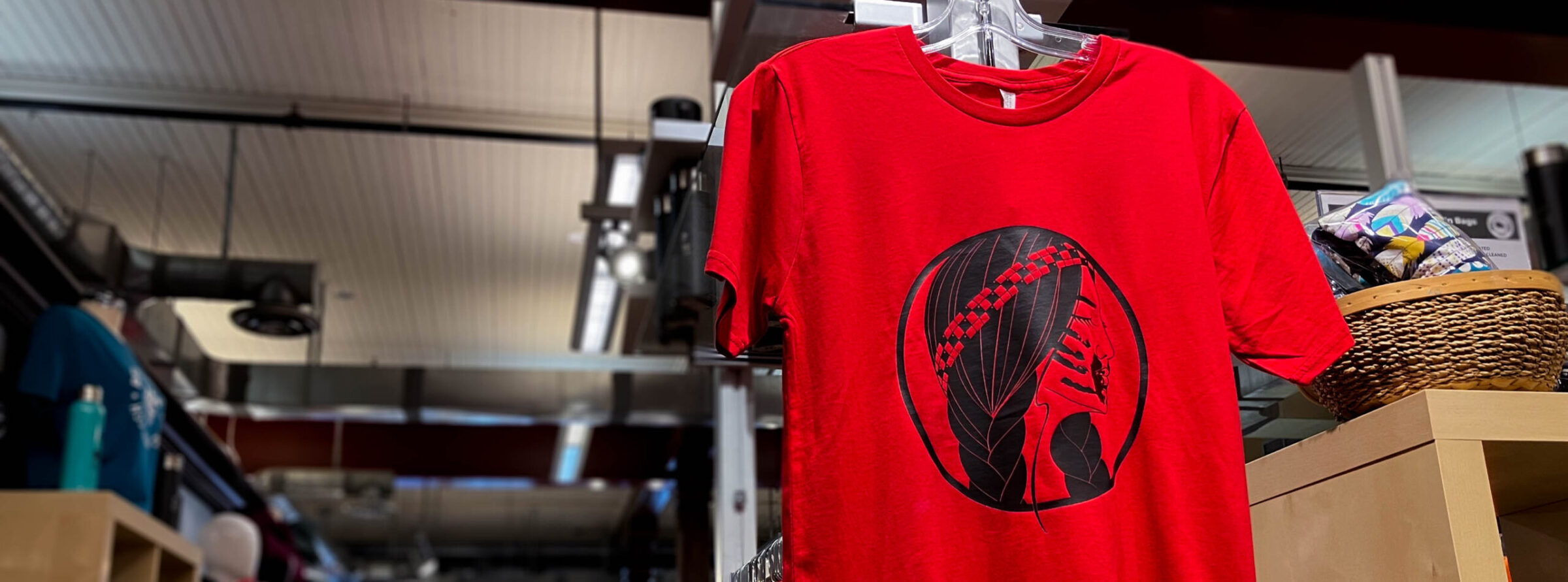RRC Polytech partners with local Métis artist for original Red Shirt design
As a tattoo and multimedia artist, Shayre Curé’s art is often specially curated for the people that commission her — regardless of the medium.
Her art is typically for the enjoyment of private buyers, in their houses or on their skin.
This year, Curé partnered with RRC Polytech to create an original Red Shirt design to honour Missing and Murdered Indigenous Women, Girls and Two Spirit People (MMIWG2S) and to support the Mínwastánikéwin Truth and Reconciliation Award for Indigenous students.
“As a Métis artist, my goal is to create art that brings awareness to this important issue. I want my art to not only reflect cultural heritage, but to inspire future generations to continue the fight for justice, equality, and empowerment,” said Curé.
The Red Shirt design portrays a woman with the emblematic handprint over her mouth that represents the “No More Stolen Sisters” movement, a phrase coined to express the outrage and grief over the loss of so many women, girls and Two Spirit people that, in many cases, could have been prevented. Curé worked in collaboration with a committee of Indigenous staff to come up with the concept.
No More Stolen Sisters. It’s a sentiment close to Curé’s heart, and the hearts of many Indigenous people.
RRC Polytech’s relationship with Curé first began earlier this year, when the Indigenous Student Support Centre purchased a piece from her entitled “The Silent Genocide on Turtle Island”—a piece that has taken her years to complete.
In 2018, she’d hand-drawn the concept for this piece shortly after her best friend Kayla was killed in a hit-and-run. The death of her best friend was devastating, though grief was not unfamiliar to Curé—she says that Kayla’s brother had also been murdered eight years prior in 2010. She’s known many people whose friends and family have gone missing or were killed over the years, and she says being able to honour them through her art and bring light to their stories is humbling.
Curé had returned to the concept last year in October 2022, when previously undisclosed details of Kayla’s case were revealed. To deal with the emotion that bubbled to the surface, the pain of injustice, and the reminder of loss, Curé transformed the original hand-drawn concept into a multimedia painting using acrylic paint and beads.
From a young age, Curé expressed herself through art—art and the process of creation was an anchor for her while growing up. As a child, Curé recalled seeing tattooed folks on TV but never on the people she knew or had seen in her area. Identifying that market planted the seeds that would later bloom into a strong and active career.
In high school, Curé says she fell in step with a bad crowd and diverged from her artistic inclinations for a few years. The summer before she started university classes for psychiatric nursing, Curé met a tattoo artist and her path circled back to her love of art, and she decided to pursue tattooing. She’s been tattooing at Tattoos by Rodriguez for the past five years and regularly creates art on skin and canvas alike.
Curé’s emotional and powerful expression of grief and hope through her painting that now lives in the Indigenous Support Centre moved RRC Polytech to approach Curé with another opportunity to collaborate on the Red Shirt design to bring more awareness to MMIWG2S, and to support Indigenous students through the proceeds from the sales.
“Through the design of this shirt, along with the acrylic painting I created for the Indigenous Student Support Centre, I pay tribute to my best friend Kayla Arkinson — her life was tragically taken on June 23rd, 2018, in Sagkeeng First Nation,” Curé said.
The Red Shirt can be purchased at the Campus Store and all proceeds go to the Mínwastánikéwin Truth and Reconciliation Award. Every Red Shirt is produced and supplied by Red Rebel Armour, owned and operated by Indigenous alumnus Sean Rayland-Boubar.
“Working with Indigenous artists and entrepreneurs to represent Indigenous ideas and movements is integral to the societal change we aim for,” said Carla Kematch, Director, Truth and Reconciliation and Community Engagement. “Initiatives like the Orange and Red Shirts are not only a strong way to raise awareness of truth and Indigenous history, but it’s also an opportunity for Indigenous people to participate in their own stories. Curé’s story is unique but many people know it well from their own experience, which makes it all the more powerful.”
The College community is invited to wear red on October 4 to show support for the families of missing and murdered Indigenous women, girls and Two Spirit people.
Artist’s Statement
Since settlers set foot on Turtle Island, a silent genocide has been perpetuated against Indigenous women. The United Nations recognized this and called on Canada to implement the MMIWG2S National Inquiry’s 231 Calls for Justice. Indigenous women are twelve times more likely to be murdered or to go missing than non-Indigenous women in Canada.
Through the design of this shirt, along with the acrylic painting I created for the Indigenous Student Support Centre, I pay tribute to my best friend Kayla Arkinson — her life was tragically taken on June 23rd, 2018 in Sagkeeng First Nation.
As a Métis artist, my goal is to create art that brings awareness to this important issue. I want my art to not only reflect cultural heritage, but to inspire future generations to continue the fight for justice, equality, and empowerment.
Shayre Curé

